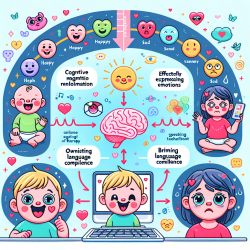As an online therapist with TinyEYE, you know how vital early intervention is for children's development. Recent research titled Relationship between early language competence and cognitive emotion regulation in adolescence highlights the importance of early language skills in developing effective cognitive emotion regulation strategies during adolescence. This blog will discuss how you can implement these findings in your practice to improve outcomes for your students.
The Link Between Language and Emotion Regulation
The study found that early language competence significantly predicts the ability to use cognitive emotion regulation strategies like temporal distancing in adolescence. Temporal distancing involves imagining a negative event from a future perspective to reduce its emotional impact. This skill is crucial for mental well-being and can be particularly beneficial for children with developmental language disorders (DLD).
Key Findings
- Language skills at school entry predict emotion regulation success in adolescence.
- Children with better early language skills are more successful at using temporal distancing strategies.
- A quarter of children with severe language difficulties were unable to complete the emotion regulation task.
Implementing the Findings in Your Practice
As a practitioner, you can leverage these insights to improve your therapeutic interventions:
Focus on Language Development
Early language skills are foundational for cognitive emotion regulation. Incorporate language development activities into your therapy sessions. Use storytelling, vocabulary exercises, and sentence imitation tasks to strengthen these skills.
Teach Temporal Distancing
Introduce temporal distancing techniques to your students. Practice scenarios where they imagine the impact of a negative event from a future perspective. Use age-appropriate language and visual aids to make the concept easier to grasp.
Engage Caregivers
Parents and caregivers play a crucial role in a child's language and emotional development. Educate them on the importance of using language to discuss emotions and strategies for emotion regulation. Encourage them to model these behaviors at home.
Monitor Progress
Regularly assess your students' language and emotion regulation skills. Use standardized tests and observational assessments to track their development. Adjust your interventions based on their progress and needs.
Encouraging Further Research
While the study provides valuable insights, further research is needed to explore other cognitive emotion regulation strategies and their relationship with language skills. Encourage your colleagues to delve deeper into this topic and share their findings.
To read the original research paper, please follow this link: Relationship between early language competence and cognitive emotion regulation in adolescence.










